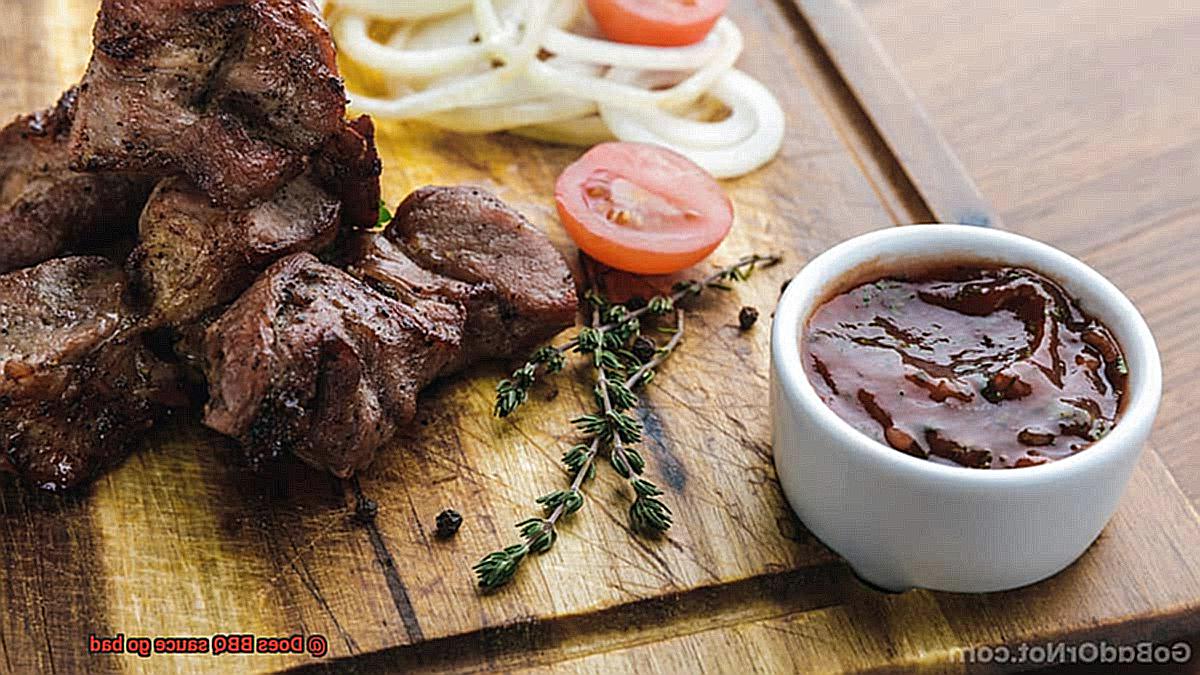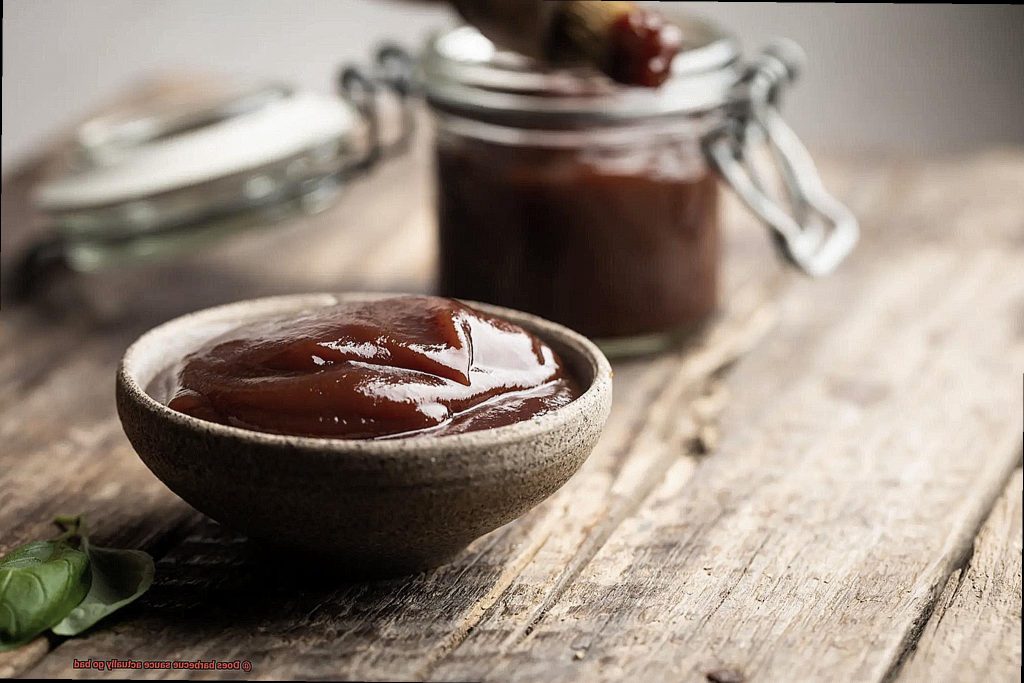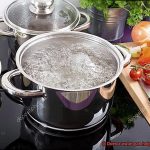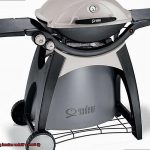Imagine this: it’s a sweltering summer day and you’re in the mood for some succulent, smoky barbeque.
You whip up a batch of your famous ribs and drench them with your go-to BBQ sauce. The combination of sweet and tangy flavors tantalizes your taste buds, leaving you feeling satisfied and content.
But hold on. You notice that there’s some leftover sauce in the bottle.
You stash it in the fridge and forget about it. A few weeks pass by and you remember the sauce.
As you take it out, a nagging thought crosses your mind: does BBQ sauce go bad? The answer is a resounding yes.
However, how do you determine when to toss it out? In this blog post, we will explore the answer to this burning question.
We’ll delve into the shelf life of BBQ sauce and common signs that indicate spoilage. Additionally, we’ll discuss practical ways to store BBQ sauce to prolong its shelf life.
Get ready to dazzle your buddies with your newfound knowledge at your next backyard bash.
Contents
How Long Does BBQ Sauce Last?

As an expert in all things BBQ sauce, I’m here to answer this essential question.
The shelf life of BBQ sauce depends on several factors, including the type of sauce, storage conditions, and ingredients used. If you have an unopened bottle of BBQ sauce, it can last for up to a year or more if stored in a cool, dry place. However, once you crack open that bottle, the clock starts ticking.
Once opened, BBQ sauce’s shelf life decreases to only a few months due to microbial growth. Air and moisture can enter the bottle, creating a perfect environment for bacteria and mold to thrive. This is especially true for sauces with high sugar content because sugar provides a breeding ground for microorganisms.
Moreover, some BBQ sauces contain perishable ingredients like fresh fruits or vegetables that can spoil quickly. These ingredients can make the sauce go bad even faster and can pose health risks if consumed past their expiration date.
To prolong the shelf life of your BBQ sauce, it’s crucial to store it properly. After opening the bottle, make sure to refrigerate it immediately and use it within a few months. If you notice any signs of spoilage, such as off smells or discoloration, it’s best to discard the sauce.
It’s also important to note that different types of BBQ sauces have different shelf lives. For example, vinegar-based sauces tend to last longer than tomato-based or mustard-based sauces. Therefore, if you’re unsure about how long your particular BBQ sauce will last, it’s best to check the label or contact the manufacturer.
Factors That Affect the Shelf Life of BBQ Sauce
Barbecue sauce is a beloved condiment that makes our grilled meats, vegetables, and fries taste even better. However, just like any other food product, BBQ sauce has a shelf life and can eventually spoil. The quality and safety of BBQ sauce are determined by several factors that affect its shelf life.
One of the primary factors that impact the shelf life of BBQ sauce is its ingredients. BBQ sauces made with natural ingredients, such as tomatoes, vinegar, and spices, tend to have a shorter shelf life compared to those made with artificial preservatives. The reason being that natural ingredients have a higher risk of bacterial growth, which can cause spoilage and contamination. Conversely, artificial preservatives such as sodium benzoate and potassium sorbate can inhibit bacterial growth and prolong the shelf life of BBQ sauce.
Another factor that affects the shelf life of BBQ sauce is its pH level. The acidity or alkalinity of the sauce can determine its susceptibility to spoilage. BBQ sauces with a low pH level, around 4.0 or lower, are more acidic and less prone to bacterial growth. This is due to bacteria being unable to thrive in acidic environments. However, if the pH level is higher, it can support bacterial growth and lead to spoilage.
The way we store BBQ sauce also plays a significant role in its shelf life. Exposure to heat, light, and air can cause oxidation and spoilage of the sauce. To extend the shelf life of BBQ sauce, it’s crucial to store it in a cool, dry place away from direct sunlight. Once opened, it should be kept in the refrigerator to slow down bacterial growth and increase its longevity.
Signs of Spoiled BBQ Sauce
As much as we love indulging in the rich and tangy flavors of BBQ sauce, it’s important to keep an eye out for any signs of spoilage. Using expired or spoiled BBQ sauce can not only ruin your culinary experience but also pose a serious health risk. So, what are the tell-tale signs of spoiled BBQ sauce? Let’s dive in and uncover the secrets.
First things first, color. Fresh and delicious BBQ sauce should have a deep red or brown hue that is as appetizing as it is mouth-watering. If you notice any change in color such as a lighter shade or even greenish tint, it’s time to take action. This change in color is often caused by the growth of mold or bacteria which can make your sauce unsafe to consume.
Texture plays a vital role in determining the quality of your BBQ sauce. Ideally, your sauce should be smooth and free of any lumps or clumps. However, if you come across any separation or clumps in the sauce, it’s an indication that the ingredients have started to break down and spoil.
The next sign that your BBQ sauce may have gone bad is its smell. A fresh bottle of BBQ sauce should have a pleasant aroma that tantalizes your senses. However, if you get a whiff of sourness or rancidity, it’s time to discard it immediately. The funky odor can be attributed to bacterial growth or fermentation which can cause serious health issues if consumed.
Last but not least, taste – the ultimate test to determine whether your BBQ sauce is still good to go. Fresh barbecue sauce should have a sweet and tangy flavor that elevates your grilled dishes to new heights. However, if your sauce has an off taste or leaves a bitter aftertaste in your mouth, it’s best to avoid it altogether.
Storage Tips for Prolonging the Life of BBQ Sauce
Here are five tips explaining the importance of proper storage for prolonging the life of BBQ sauce:
Check the Expiration Date
Before purchasing or using BBQ sauce, always check the expiration date on the bottle. While most brands have a shelf life of 6-12 months, this can vary depending on the type of sauce. Using expired BBQ sauce can lead to unpleasant taste and even food poisoning.
Keep it Cool and Dry
Exposure to heat and humidity can cause mold growth and spoilage in BBQ sauce. To prevent this, store your sauce in a cool and dry place away from direct sunlight or any sources of heat. A cool pantry or cabinet is an ideal spot.
Refrigerate After Opening
Once you open your BBQ sauce, transfer it to the refrigerator as soon as possible. This will slow down the growth of bacteria and prevent spoilage. For best results, keep the lid tightly sealed to prevent air from entering the bottle.
Use an Airtight Container
If you want to extend the shelf life of your BBQ sauce even further, transfer it to an airtight container. This will prevent air from oxidizing the sauce and causing it to spoil. Don’t forget to label the container with the date it was opened so you can keep track of its freshness.
Discard if Spoiled
If you notice any signs of spoilage such as a strange odor or mold growth, it’s best to discard the sauce immediately. Consuming spoiled BBQ sauce can lead to food poisoning and ruin your grilling experience. Always err on the side of caution when it comes to food safety.
Types of Ingredients That Impact Shelf Life
The longevity of BBQ sauce depends on several factors, including the types of ingredients used in the sauce.
One of the most significant ingredients that can affect the shelf life of BBQ sauce is vinegar. Vinegar is a natural preservative that inhibits the growth of harmful bacteria and fungi that can spoil the sauce. However, too much vinegar can make the sauce too acidic and unappetizing, while too little vinegar can lead to spoilage. Therefore, it is essential to use the right amount of vinegar to ensure that your BBQ sauce stays fresh for as long as possible.
Sugar is another ingredient that can impact shelf life. Sugar helps to balance out the acidity of vinegar and adds flavor to the sauce. However, too much sugar can cause fermentation, leading to spoilage. To avoid this, it’s crucial to store your BBQ sauce properly and use it within six months of opening.
Salt is a natural preservative and is another common ingredient in BBQ sauce. It helps to draw moisture out of bacteria, preventing their growth and spoilage. However, too much salt can make the sauce too salty and not enjoyable. Therefore, it’s crucial to find the right balance between salt and other ingredients.
Finally, spices and herbs used in BBQ sauce can also affect its shelf life. While they add flavor and aroma to the sauce, they can also contribute to spoilage if they are not fresh or stored properly. It’s essential to use fresh herbs and spices and store them in an air-tight container away from heat and light.
Alternatives to Traditional BBQ Sauces
The smoky aroma of grilled meat and the sound of sizzling steaks is a surefire way to bring friends and family together. However, not everyone is a fan of traditional BBQ sauce. If you’re looking for a new way to spice up your grilling game, fear not. There are plenty of mouth-watering alternatives available that will add a unique flavor to your grilled meats.
Firstly, if you’re looking to keep things healthy, consider making your own marinade. A combination of olive oil, lemon juice, and herbs can make your meats tender and juicy without the added sugar. Plus, you can customize it to your taste preferences by adding your favorite spices.
For those with a sweet tooth, try fruit-based sauces like mango or pineapple BBQ sauce. These sauces offer a sweet and tangy flavor that pairs exceptionally well with grilled chicken or pork.
If you’re looking for something with a kick, hot sauce or chili paste can be an alternative to traditional BBQ sauce. You can even mix it with honey or maple syrup to balance out the heat and sweetness.
For the more adventurous grill masters, why not experiment with international flavors? Korean gochujang or Indian tikka masala sauces offer a unique taste that will surely impress your guests at your next BBQ.
Benefits of Using Freshly Made BBQ Sauces
Look no further than freshly made BBQ sauce. As an expert in all things grilling and flavor, I can tell you that there are numerous benefits to making your own sauce from scratch.
First and foremost, the taste is incomparable. Pre-packaged sauces on the market can have a long shelf life, which means they often contain preservatives and other chemicals that can impact the flavor. But by using fresh ingredients, you can ensure a clean and authentic taste that will impress your guests and elevate your grilling experience.
But taste isn’t the only advantage of making your own BBQ sauce. Here are some additional benefits to consider:
- Healthier Option: Store-bought sauces often contain high levels of sugar, sodium, and preservatives, which can be harmful to your health if consumed regularly. By customizing your own sauce, you can control the ingredients you use, making it a healthier option for you and your family.
- Customizable: Making your own BBQ sauce also allows for more control over the flavors and spices used. You can experiment with different herbs, spices, and flavors to create a sauce that suits your taste buds perfectly. And by adjusting the thickness and texture of the sauce, you can make it more suitable for different kinds of meat or vegetables.
- Fresher Ingredients: Pre-packaged BBQ sauces can sit on shelves for long periods, which means they may contain expired or stale ingredients. When making your own sauce, you have access to fresh and high-quality ingredients that not only enhance the flavor but also provide more nutritional value.
- More Economical: While pre-packaged sauces may seem cheaper at first glance, they often come in small quantities that quickly run out for avid grillers. Making your own sauce allows you to make larger batches at a lower cost per serving, saving you money in the long run.
Tips for Making Your Own BBQ Sauce
Tips for Making Your Own BBQ Sauce: Ensuring Freshness and Safety
Making your own BBQ sauce is a delightful experience that allows you to create a custom blend of flavors that satisfies your palate. However, homemade sauces have a shorter shelf life than store-bought ones, as they lack preservatives and stabilizers. Here are five tips to ensure your BBQ sauce stays fresh and safe to use:
Use Fresh Ingredients
Fresh ingredients are the foundation of a tasty and healthy BBQ sauce. Always check the expiration dates of the ingredients you plan to use, including spices, liquids, and vinegar. Expired ingredients can cause the sauce to spoil quickly, even if you store it correctly.
Storing in an Airtight Container
After making your sauce, store it in an airtight container in the refrigerator. This helps prevent bacteria growth and keeps the sauce fresh for longer. Homemade BBQ sauce has a shorter shelf life because it lacks preservatives, so it’s essential to store it correctly.
Sensory Check
If you’re not sure whether your homemade BBQ sauce has gone bad or not, use your senses to determine its freshness. If the sauce has an off smell, unusual texture, or tastes sour, it’s best to discard it and make a fresh batch. It’s better to be safe than sorry.
Start with a Good Base
A good base is crucial to any BBQ sauce recipe. Start with tomato sauce or ketchup, which provides the sweetness and acidity characteristic of BBQ sauce. You can then add other ingredients like vinegar, Worcestershire sauce, honey, mustard, paprika, garlic powder, and cumin to create a unique flavor profile.
Balance of Flavors
The key to making great BBQ sauce is balancing sweet, sour, salty, and spicy flavors in the right proportions. For example, if you want a sweeter sauce, add more brown sugar or honey. If you prefer a tangier flavor, add more vinegar or lemon juice. If you want a saltier sauce, add more soy sauce or Worcestershire sauce. And if you want a spicier sauce, add more chili powder or hot sauce.
Conclusion
In conclusion, it’s crucial to know that BBQ sauce does indeed go bad. The lifespan of your BBQ sauce depends on various factors, such as the type of sauce you have, storage conditions, and ingredients used. As soon as you crack open that bottle of BBQ sauce, its shelf life starts to decrease due to air and moisture entering the bottle, leading to microbial growth.
To avoid ruining your culinary experience or even causing food poisoning, it’s essential to store your BBQ sauce correctly. Refrigerating it immediately after opening and using it within a few months is crucial. Signs of spoilage include off smells or discoloration, separation or clumps in the texture, funky odors, or an off taste that leaves a bitter aftertaste in your mouth.
Fortunately, there are steps you can take to prolong the shelf life of your BBQ sauce. Always check the expiration date before purchasing or using BBQ sauce; keep it cool and dry; refrigerate after opening; use an airtight container; discard if spoiled.
If you’re up for a challenge and want ultimate control over your BBQ flavors, making homemade BBQ sauce is an excellent option. Not only can you customize it to suit your taste buds’ preferences, but you’ll also be using fresh ingredients while saving money in the process. Just remember to balance sweet-sour-salty-spicy flavors in the right proportions while ensuring freshness and safety by using good bases with fresh ingredients.






